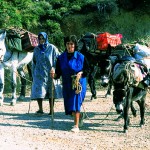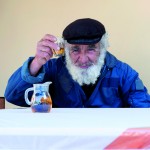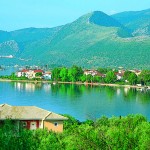 While I am working in the Sunvil UK office over the winter months, my thoughts keep returning to the lovely Ionian Islands on the west coast of Greece. This is because I am lucky enough to be the Sunvil and GIC – The Villa Collection local representative for Lefkas during the summer months. As tourists, or workers in the tourist industry, we generally only see the islands during the season which lasts from May to October in this part of Greece. What may surprise many people is that there is a very different pace of living on the islands when the winter comes – in many ways Greece reverts to the ‘old way of life’ that used to prevail before tourism started in the 1960s.
While I am working in the Sunvil UK office over the winter months, my thoughts keep returning to the lovely Ionian Islands on the west coast of Greece. This is because I am lucky enough to be the Sunvil and GIC – The Villa Collection local representative for Lefkas during the summer months. As tourists, or workers in the tourist industry, we generally only see the islands during the season which lasts from May to October in this part of Greece. What may surprise many people is that there is a very different pace of living on the islands when the winter comes – in many ways Greece reverts to the ‘old way of life’ that used to prevail before tourism started in the 1960s.
At the moment there is a lot of publicity about the unsettled atmosphere in Greece but this doesn’t apply to island life where the old winter rhythms continue as they have for centuries. The first thing that happens in October is that all the migrant workers leave the island and the island settles into winter mode. Many of the bustling tavernas shut their doors, the hotels and apartments are closed and their owners turn to their other businesses. The first and most important job is olive picking. In Greece the olive tree is not just representative of peace but also of prosperity. Anyone who owns olive trees has access to a supply of olives, oil, wood and other good things (for example soap and light) and the harvest generally begins in November or December.
If you have seen piles of black nets lying around the olives groves you may have wondered what these were for – they form an integral part of the harvest procedure and it’s all hands on deck when the fruit is ready as the olive harvest is regarded as a social occasion. The olives are not picked individually; instead the trees are beaten with long sticks causing the fruit to fall into the nets which are spread underneath the trees. After this, the olives are either taken to the local olive press or prepared for eating.
Other than harvesting olives, local people spend time on their wine making, production of honey and general maintenance of the land and agricultural areas. On mountainous islands like Kefalonia and Lefkas it is often difficult to cultivate the land and so the production of wine, honey and olive oil has become very important because both vines and olive trees grow on any terrain. These activities are the principal focus of the winter months. In Corfu the islanders harvest the kumquat fruit, which forms the basis of their famous liqueur, in the months from January to May. Likewise, the oranges have to be harvested from the trees and this can be seen in the early months of the year on islands like Crete, as well as in many mainland areas such as the Peloponnese.
cultivate the land and so the production of wine, honey and olive oil has become very important because both vines and olive trees grow on any terrain. These activities are the principal focus of the winter months. In Corfu the islanders harvest the kumquat fruit, which forms the basis of their famous liqueur, in the months from January to May. Likewise, the oranges have to be harvested from the trees and this can be seen in the early months of the year on islands like Crete, as well as in many mainland areas such as the Peloponnese.
However, it’s not all hard work during the winter in Greece. There are some winter activities that may surprise those of us who associate our favourite destination with beaches, sunshine and swimming. In fact, Greece has some resorts that specialise in winter sports and skiing is a surprisingly popular winter activity for many Greeks, especially in the mainland areas of Epirus and around Delphi.
There is also a period of celebration known as ‘Carnival’, which is a time of fun and feasting before the fasting of Lent. The Greek city of Patras has particularly vibrant celebrations although these do not usually coincide with the festival in Brazil because the fiesta is based on the Greek Orthodox calendar which differs from the Catholic calendar.
The other thing that keeps the Greeks busy in the winter is getting their properties ready to welcome back the summer tourists so, as I write, I imagine all the work going on to ensure that everything is perfect in resort for when you and I return…the season starts in May and I cannot wait to get back to my island paradise.
Janine Cording,
Sunvil Holidays and GIC The Villa Collection Representative






I think olive picking is such a good winter activity